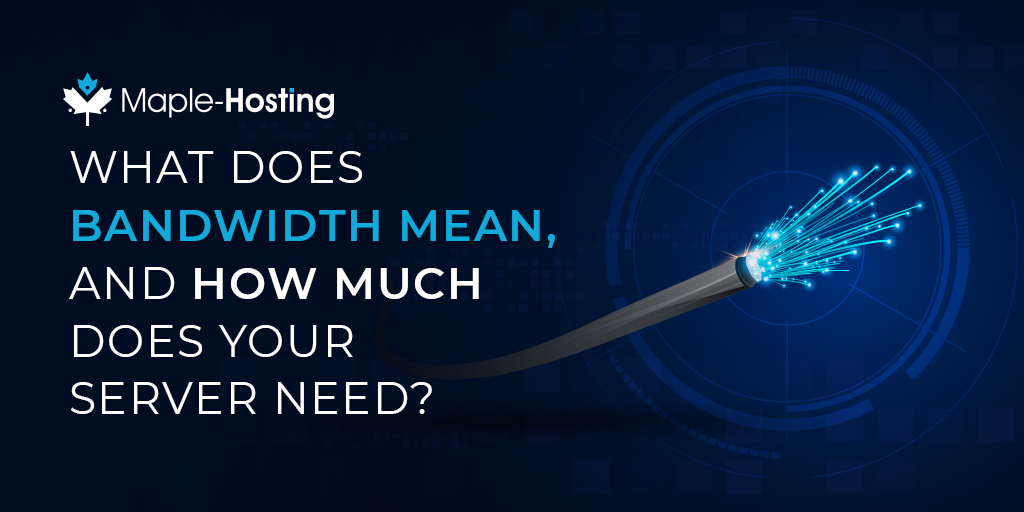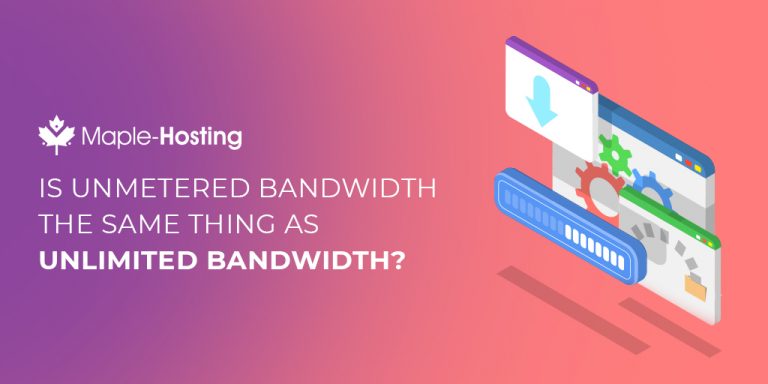
A slow website is one of the quickest ways to miss out on leads or lose buyers. Customers are getting more and more intolerant of slow websites and will click away within a few seconds if your site is still loading.
Even if your web server contains the latest components, plenty of fast storage, and lots of memory, your site will still be slow if you don’t have enough bandwidth to support the amount of traffic you’re getting.
So what does bandwidth mean? Let’s take a look.
Bandwidth vs Data Transfer
In web hosting, bandwidth is the amount of transferable data within a given amount of time. In web servers, it also refers to the included amount of data transfer.
A web server that can transfer 2 Gbps (Gigabits per second) has more bandwidth that a server that can transfer 1 Gbps.
The other aspect of bandwidth that you’ll see when comparing web servers is the amount of data transfer that’s included.
These amounts are tracked monthly so a plan that includes 100 TB of data lets you transfer up to that much every month.
What Does Bandwidth Mean for Your Bottom Line?
Server costs will increase as either aspect of bandwidth increases and in many cases, if you exceed the data transfer amount you’ll face overage charges.
These charges can escalate quickly and you can find yourself faced with significant overage charges, much like you would if you went over your cell phone data limits.
Fortunately, there’s a way to avoid this problem with web servers – unmetered bandwidth.
Metered vs Unmetered Servers
A metered server includes a certain amount of data transfer every month, like the 100 TB example above. If you use more than the included amount, you’ll pay for the extra data.
An unmetered server typically includes an unlimited amount of data transfer every month. We say “typically” because some web hosting companies don’t offer truly unlimited transfers.
They might slow down your server’s transfer speeds if you reach a certain amount, limiting how much data you can use.
Maple-Hosting’s unmetered dedicated server plans are truly unmetered. Your server could be operating at its bandwidth capacity 24 hours a day and it will continue to serve data to your visitors at top speed.
How Unmetered Bandwidth Works
With an unmetered server, the bandwidth refers to the size of the port, which determines how much information your web server can deliver at any given time.
This will affect how many visitors can land on your website at the same time without it slowing down.
Think of the bandwidth port like a multi-lane highway.
The same number of cars can travel from point A to point B on a four-lane highway as on an eight-lane highway but with eight lanes a lot more cars can travel at normal speeds before you get a traffic jam.
They would still get to their destination with only four lanes but they would get there slower.
Bandwidth ports work the same way. A larger port lets your server deliver content to more people at the same time.
The smaller port will still deliver that content but it will get there slower. If it’s too slow, there’s a good chance you’ll lose that visitor.
A Larger Port Isn’t Always Faster
It’s important to note that a larger port won’t speed things up unless your website is getting enough traffic to use the extra bandwidth.
If you’re not delivering enough information to use all of a 1 Gbps port, a 2 Gbps port won’t make a bit of difference.
Your bandwidth requirements are based on concurrent visitors to your website. If you only have a handful of people visiting your site at any given time, the peak bandwidth may not be that much.
Where you run into bandwidth (and therefore performance) issues is when you have a lot of visitors hitting your site at the same time.
How Much Bandwidth Does My Website Need?
The amount of bandwidth you’ll need depends on two things:
- The type of content you’re delivering
- The number of concurrent visitors
If your website contains mostly text content, your bandwidth needs will be relatively low. Audio, images, and video need more and streaming video will need the most.
If you will be streaming video to your visitors, there’s no question you should go with an unmetered server.
The monthly cost will be a bit higher than it would for a metered server but the difference is next to nothing compared to what you could end up spending on overage fees with a metered server.
And Maple-Hosting’s unmetered servers are quite reasonably-priced even compared to most metered servers. Especially when you add our fully managed support option.
Find Your Streaming Server With Our Recommendation Wizard
We make it really easy to calculate your bandwidth requirements. We’ve created a one-of-a-kind server recommendation wizard.
This wizard will ask you a few simple questions and will then calculate the amount of bandwidth and RAM you need, as well as provide a dedicated server recommendation so you can get started right away.
How to Calculate Bandwidth Needs for Streaming Video
If you’re going to be streaming video to your site visitors, you’ll want to be sure you get a bandwidth port that can keep up.
You can get a pretty good idea of how much you need if you know what type of video you’ll be streaming and the maximum number of viewers you’re likely to have at any given time.
The resolution of the video will determine how much data is being transferred. Some of the more common stream rates include:
- Medium resolution (640×360) – approximately 800 kps to 1200 kps
- HD 720 (1280 x 720) – approximately 4000 kps
- HD 1080 (1920 x 1080) – approximately 4000 kps to 8000 kps
To calculate the bandwidth requirement, multiply the number of concurrent users by the stream rate. So if you had 500 concurrent users watching HD 720 video, this would be your calculation:
500 (number of users) X 4000 (stream rate) = 2,000,000 or 2Gbps
In this case, a server with a 2Gbps port would suit your needs.
Maple-Hosting Is Here to Help
If you’re still not entirely sure what does bandwidth mean or if you want some help figuring out exactly how much you should be considering, Maple-Hosting can help answer those questions.
Our friendly, helpful support team is available 24/7/365 so don’t hesitate to get in touch with us if you have any questions.
We’ll help you find the right server for your needs, with enough bandwidth to be sure your website visitors won’t have to wait for your site to load.
Award-Winning Dedicated Servers
Please select the dedicated server type that best matches your needs:




[…] web hosting, bandwidth is the amount of transferable data within a given amount of time. In web servers, it also refers to the included amount of data […]
[…] on a dedicated server is yours. You don’t have to worry about sharing server bandwidth during peak business hours. The web host will give you root access to the server, allowing you to […]
[…] of the first things you need to consider when building a website is how much bandwidth will be required. Bandwidth usage depends on several factors, such as the number of daily visitors. […]
[…] settling on a server, calculate how much bandwidth you need by estimating how many concurrent viewers you’ll have and multiplying that number by the stream […]